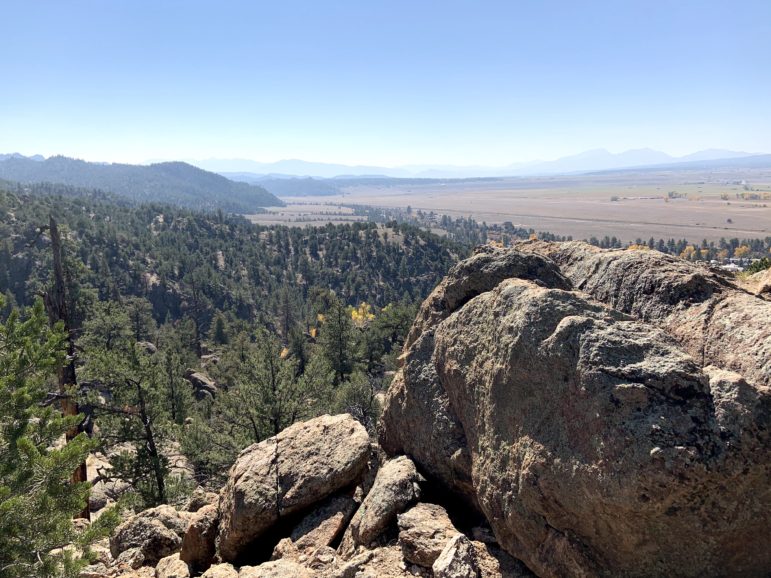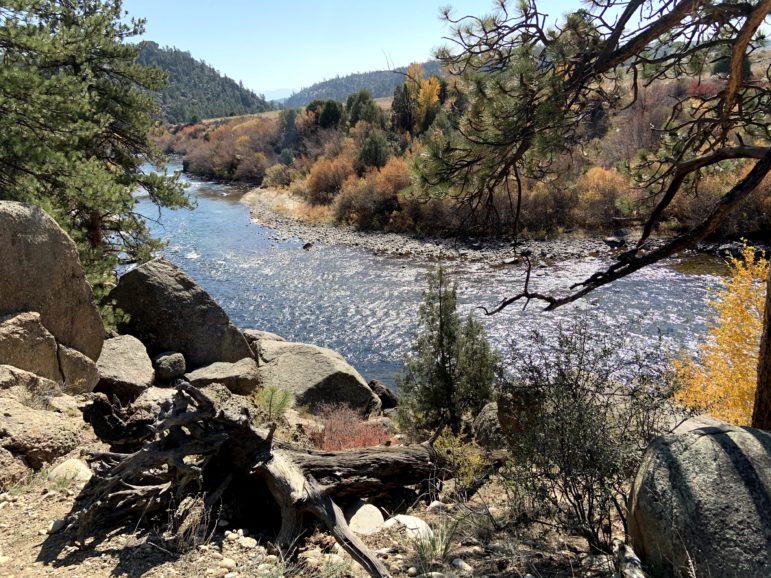
I thought I might die yesterday.
At the bottom of a small mountain in Browns Canyon National Monument, outside of Nathrop, Colorado, I sat with my back against a rock. My legs did not respond to any attempt to rise to my feet. I had half a bottle of water left in my backpack, and although I was only a mile away from my car, that mile went over the mountain.
The sun began to dim. I watched the golden leaves of the autumnal aspen shining in its light and wondered how long it would be before somebody came by. I had seen exactly four other people on the trail, and only one of them had gone any further than this point. I had come for the solitude – I had read online how national monuments, and Browns Canyon in particular, offered natural beauty on the level of national parks without the crowds. This proved true, but then, there are some advantages in crowds.

A view from atop Browns Canyon National Monument, overlooking a forest of pines, firs, and aspen [E. Scott]
I was not in real danger – I was only a mile from the trailhead, even if that mile felt brutal on my soft, untrained body. I even had cell service. I could text friends to talk me through the last bit of my trek, and I had never lost track of the trail or the position of landmarks like the Arkansas River or Mount Ruby.
I knew this – knew it intellectually, knew it well enough to explain in texts – and yet, I also knew that I had made a mistake, that this was beyond my body’s tolerances. I felt strains and aches in unfamiliar muscles, fire in my lungs from the elevated air, utter despair at the thought of taking another step upward. My body – sedentary, fat, unused to this kind of exertion – threatened to buckle under the toil. I found myself making promises with it: we’ll have a drink as soon as we round this corner, or, we’ll have a rest as soon as we reach the shade of that tree. The negotiations became more strained the longer they went on. At some points I could only walk a hundred feet before needing to stop, my breath an everlasting yawn.
None of this was a surprise to me – the trail was a loop, starting at Mount Ruby and ending at the river. I had already ascended and descended this part of the Turret Trail once, and I had chuckled to myself about how much the return trip would hurt then. My partner had wisely bowed out once we reached the zenith of that first part of the trail, preferring to return the way we had come and explore other parts of the monument. Me, I was too in love with the idea of this long hike along a rugged trail in the back country. It was only six miles round-trip – probably not too exciting for more experienced outdoors folk, but for me, it seemed a bold and adventurous distance.
At the bottom of the mountain, the trail led through flat scrubland, where the only obstacle was afternoon heat. I had intended to only follow the trail to where it split, one half leading to the river and the other deeper into the mountains. I stood at the sign, drinking half a bottle of Gatorade, and decided that it would be a shame to not hike the last mile to the river. And this was true; I did hike that extra mile, where I saw the Arkansas River sparkling in the sunlight. I climbed down the rocky cliff at the overlook and listened to the water rushing past, and finished off the bottle. It was gorgeous: I have always loved waterways best of all things in nature.
It was as I started to climb back up the cliff that I remembered one of the immutable laws of existence: walking an extra mile forward means walking an extra mile back.

The Arkansas River, at the far end of the trail, shimmering in the sunlight [E. Scott]
I don’t have a body; I am a body. I know this – know it intellectually, know it well enough to write into texts – and yet in daily life I slip all too easily into the dualism of mind and body that is the inheritance of a Christian conception of the soul.
The fact that I live so much of my life on the internet exacerbates this since so much of “me” exists somewhere online, and that “me” constantly interacts with other electronic minds without my immediate knowledge. Even with the conscious rejection of the dichotomy, it is easy for me to think of my body as something apart from myself – like it is a tool or a vehicle, a house in need of some nails and paint. (Even now, in this article, I am writing about my constant need to rest while climbing as though I were negotiating with something other than my own self.)
Midway up the canyon, I took a step with my left foot, and then a step with my right. But instead of going straight, as I thought it would, my right crossed over my left, and I stumbled forward in a lazy spiral. I was not climbing a ledge, nor jumping across a gap – the incline wasn’t even very steep. I stopped, considering my loss of control over myself in that moment. But I did not feel disassociated from my body; I was, instead, profoundly aware of it, of myself as my body, of the immense unity of the two concepts.
I found my way to a ledge, where I sat and finished the last of my water. I was exhausted, miserable, dehydrated, possibly on the verge of altitude sickness. But I was also more conscious of my own embodiment than I had been in months – of my own sense of being alive. I am Pagan; I am made of earth, am part of the earth. That is the reason I had wanted to take my rugged hike in the first place. I am not a soul in a cage. I am living. I am alive.

Your author, sitting with his back against a rock at the bottom of Browns Canyon; he is patiently expecting death, but is alive, alive [E. Scott]
There is another immutable law of existence: what goes up must come down. Once I reached the top of the canyon, it was easier – though by no means easy – for me to keep putting one foot in front of the other, trusting in gravity to bring me closer to my destination. Without realizing how I had gotten there, I found myself staring at the sign for the trailhead; past that, the path was a straight line down Mount Ruby, and after that, the lot where my car and my partner were waiting for me. I looked at the chalk-white mountain, quite confused and feeling as though I had somehow skipped a significant portion of the path back.
I collapsed into the passenger seat of the car. My partner offered me a metal bottle, which was full of the coldest water I had ever tasted. When I came to my senses, I apologized for setting off for so long; I had been out at least an hour longer than I had promised. I felt I had learned a lesson about myself and my existence as part of the earth, and I was glad to have learned it – but I hated to think that she might have been distressed at the idea that I was hurt or lost. “I’m sorry if I worried you,” I said.
“It’s okay,” she said, driving us out back out toward our cabin. “While you were gone, I nearly woke up a mountain lion.”
The Wild Hunt is not responsible for links to external content.
To join a conversation on this post:
Visit our The Wild Hunt subreddit! Point your favorite browser to https://www.reddit.com/r/The_Wild_Hunt_News/, then click “JOIN”. Make sure to click the bell, too, to be notified of new articles posted to our subreddit.
Pingback: Antler Review: October Spooks and Surprises | Meg Elison